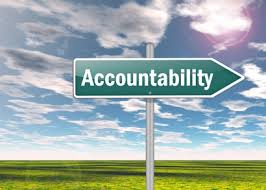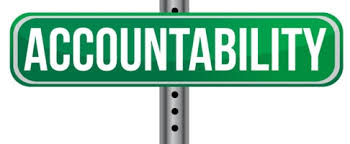Compliance Program Effectiveness Requires Accountability
 A compliance program requires accountability. You can have ethics and you can have compliance policies, procedures and all the bells and whistles, but someone has to be accountable. Without it, a compliance program will just float along, waiting for the next catastrophe to hit.
A compliance program requires accountability. You can have ethics and you can have compliance policies, procedures and all the bells and whistles, but someone has to be accountable. Without it, a compliance program will just float along, waiting for the next catastrophe to hit.
It is hard to watch an ethics and compliance program that is adrift. My nature is to face issues, make decisions and move on. I cannot understand how an organization, its leaders, and a group of people can sit around, talk about what has to be done, and then fail to act because no one is making decisions, and more importantly, no one is being held accountable.
The contrast to this picture can be striking – an ethics and compliance program where one person or a committee of persons is charged with responsibility for managing the program. The person and/or committee are charged by the board and the CEO to “get the job done.” That is music to my ears. That is when things happen, changes are made, and ethics and compliance activities increase, all to the benefit of the company.
Where does the message of accountability come from – either the board of directors and/or the CEO? If they have no expectation of accountability in senior management, then they are basically throwing up their hands and letting the winds dictate corporate actions.
A Chief Compliance Officer operating in this environment will be frustrated. The authority of the CCO is equal to the expectations and accountability of the CCO. By definition, accountability means that the corporate organization has to provide the resources and support to get the job done. Accountability provides the CCO with credibility and the ability to request resources and support.
A CCO wants nothing less than to be held accountable. A company unwilling to make decisions, hold persons accountable, and support their efforts is doomed to fail.
The importance of accountability is not just applicable to the senior executives. It is an important value that extends down into the company’s culture. If employees are held accountable, they have a responsibility to carry out their jobs effectively and consistent with management expectations. Employees want to know what is expected of them so they can feel that they have met certain goals and objectives. It is a basic human drive and need.
An organization has to instill incentives and rewards in a way to incentivize employees and promote productivity. Holding everyone accountable to the appropriate standard of performance is a critical value that extends throughout a company.
If an ethics and compliance program is lacking any accountability, you can rest assured that many other corporate functions are lacking the same important requirement. A company has to demonstrate its commitment to accountability in a variety of contexts – ethics and compliance is an easy function to apply accountability, and such a standard should  apply not only to the CCO but to senior executives, managers and employees.
apply not only to the CCO but to senior executives, managers and employees.
The best way to communicate this expectation is through your code of conduct, which should be reinforced through an annual evaluation that includes an ethics and compliance component. Everyone in an organization should be held accountable for his or her ethics and compliance performance. Evaluating everyone on this same standard is a valuable means to promote ethics and compliance and organizational accountability.














